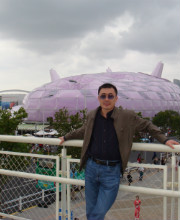| 图片: | |
|---|---|
| 名称: | |
| 描述: | |
- B42腮腺腺样囊性癌?
-
xiaoyan0290 离线
- 帖子:1179
- 粉蓝豆:512
- 经验:2063
- 注册时间:2008-07-15
- 加关注 | 发消息
-
本帖最后由 Chiang 于 2013-05-02 17:03:04 编辑
没有看到明确的神经浸润 免疫组化在鉴别基底细胞腺瘤和腺样囊腺癌意义大吗?
经上级医院会诊:基底细胞腺瘤局部恶变(腺样囊性癌)
感觉这个会诊意见很有水平的,我理解这个诊断的本意可能是想传达两层意思,一是说明病变主体是良性,但还是不放心,二是不建议临床过治疗。
这样的报告对病理医生来说,“进”、“退”都不失高明之举,而不谙病理报告含义的临床医生更多的则是“进”、“退”两难!
-
liangjinjun 离线
- 帖子:2328
- 粉蓝豆:2
- 经验:2457
- 注册时间:2007-08-07
- 加关注 | 发消息
ADENOID CYSTIC CARCINOMA(陈国璋教授讲课内容)
一、概述
1、An infiltrative carcinoma having various features of three growth patterns: glandular (cribriform), tubular or solid
2、Two cell type:
ductal-lining cells
myoepithelial / basal type cells
3、Usually a slow-growing tumor
4、Bone invasion may occur without radiological evidence
二、Adenoid cystic carcinoma: pathology
1、Gross: Invasive borders; solid appearance
2、Tubules, cribriform structures, solid masses
3、Variable amounts of hyalinized stroma (sometimes “drowning” the tumor)
4、May have lattice-like pattern, and abundant stromal mucin/hyaline material
5、Perineural invasion is characteristic (but not essential for diagnosis)
三、Adenoid cystic carcinoma:cell types
1、Ductal epithelium
Cuboidal
Surrounds distinct small lumina (often with eosinophilic secretion)
Eosinophilic cytoplasm; vesicular nuclei
Can be difficult to appreciate
2、Small basaloid cells (modified myoepithelium)
Often predominant
Hyperchromatic nuclei
Indistinct cell borders
Often associated with basement membrane material, hyaline material or stromal mucin
四、Adenoid cystic carcinoma: checklist for diagnosis
Invasive borders
Two-cell type (ductal epithelium may be difficult to find)
Variable amounts of basement membrane and hyaline material
Cribriform structures often present
Clear cells very rare
-
xiaoyan0290 离线
- 帖子:1179
- 粉蓝豆:512
- 经验:2063
- 注册时间:2008-07-15
- 加关注 | 发消息
-
liangjinjun 离线
- 帖子:2328
- 粉蓝豆:2
- 经验:2457
- 注册时间:2007-08-07
- 加关注 | 发消息
-
xianyuanqq82 离线
- 帖子:455
- 粉蓝豆:55
- 经验:456
- 注册时间:2009-02-04
- 加关注 | 发消息
-
本帖最后由 Chiang 于 2013-03-26 15:12:05 编辑
这是一个具有挑战性的例子,两种细胞和筛状结构,最容易混淆的就是基底细胞肿瘤还是腺样囊性癌。
腺样囊性癌:浸润性生长、假囊真导管分化,基底样细胞胞质淡染至透明、核深染卵圆形或成角。
基底细胞腺瘤:肿瘤有完整包膜、细胞两种类型,细胞学温和,基底样细胞胞质丰富,核圆或卵圆,细胞巢外周常呈栅栏状。
本例形态学表现更符合基底细胞腺瘤,尽管筛状结构更多见于腺样囊性癌,但多形性腺瘤或基底细胞腺瘤偶尔也可表现明显的筛状结构,但后者的细胞形态和结构不同的肿瘤还是有区别的。
下面这段话摘自Diagnostic Histopatholog of Tumors, 3rd. Edited by Flecther CDM.
对涎腺恶性肿瘤的正确的病理诊断很有价值,尤其是腺样囊性癌的诊断和鉴别。作者强调了浸润(invasion)在诊断恶性时的价值!
楼主提供的这个例子有三幅图片证明肿瘤没有浸润包膜,因此,诊断腺样囊性癌是值得怀疑的,宁愿诊断基底细胞腺瘤。
The importance of identification of invasion cannot be overemphasized. A presumptive diagnosis of adenoid cystic carcinoma must be wrong if tissue infiltration is not identified;similarly, this diagnosis should be viewed with some skepticism if extensive sampling of the tumor fails to reveal perineural invasion. Since adenoid cystic carcinoma may overlap morphologically with basal cell adenoma and sometimes pleomorphic adenoma, identification of invasion is one of the most important parameters for making the distinction. For some tumors, the presence of frank invasive features alone automatically moves the designation from the benign to the malignant category even if the tumor is morphologically blandlooking, for example, myoepithelial, basal cell and oncocytic neoplasms. The implication is that the tumor borders must be adequately sampled for examination. In some circumstances, a definitive diagnosis may not be possible without the opportunity to assess the tumor borders, such as in needle or incisional biopsies.










































